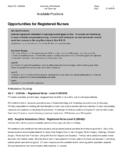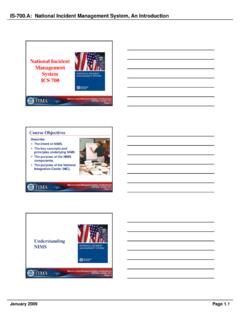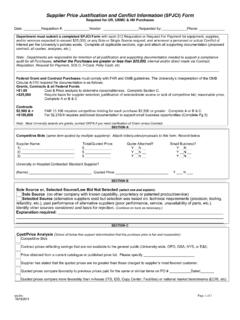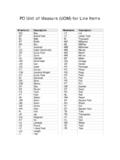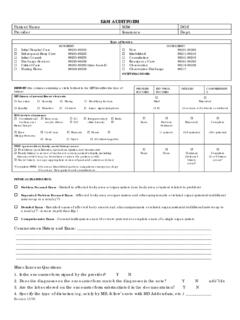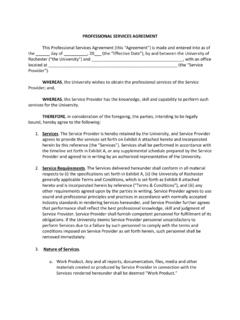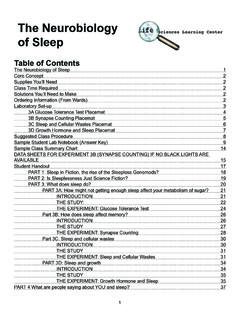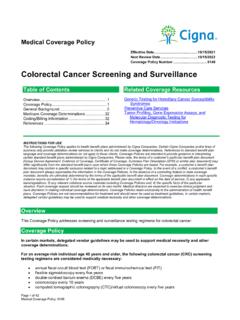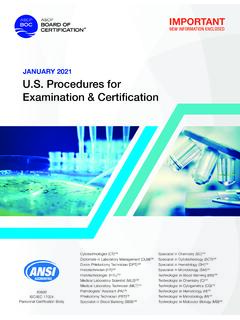Transcription of Investigational Products: IP Management and Accountability
1 Investigational Products: IP. Management and Accountability Kyle Richards, PharmD, BCPPS. Stephen A. Bean, PharmD. Investigational Drug Service Department of Pharmacy Learning Objectives Describe the Code of Federal Regulations (CFR) and Good Clinical Practice (GCP) guidelines as they pertain to study drugs. Describe national and state standards and laws applicable to study drugs. Describe the lifecycle of an Investigational drug. Explain how the Investigational Drug Service (IDS) can help Investigators/Study Coordinators fulfill these requirements. 2. Regulations and Standards Code of Federal Regulations (CFR).
2 Good Clinical Practice (GCP). NY State Regulations Hospital Policy (IRB). The Joint Commission (TJC). american society of Health System Pharmacists (ASHP). hematology Oncology Pharmacy Association (HOPA). 3. Code of Federal Regulations 4. General Responsibilities of Investigators An investigator is responsible for ensuring that an investigation is conducted according to the signed investigator statement, the Investigational plan, and applicable regulations; for protecting the rights, safety, and welfare of subjects under the investigator's care; and for the control of drugs under investigation.
3 5. Investigator Record Keeping and Retention (a) An investigator is required to maintain adequate records of the disposition of the drug. (b) An investigator is required to prepare and maintain adequate and accurate case histories that record all observations and other data pertinent to the investigation on each individual administered the Investigational drug or employed as a control in the investigation. (c) An investigator shall retain records for a period of 2 years following the date a marketing application is approved for the drug for the indication for which it is being investigated, or until 2 years after it is D/C and FDA is notified 6.
4 Handling of Controlled Substances If the Investigational drug is subject to the CSA, the investigator shall take adequate precautions, including storage of the Investigational drug in a securely locked, substantially constructed cabinet, or other securely locked, substantially constructed enclosure, access to which is limited, to prevent theft or diversion of the substance into illegal channels of distribution. Cabinet must meet NYS regulations NYS likely to inspect NYS requires that the site/PI obtain a Class 4 Researcher's license 7. Good Clinical Practice 8. What is Good Clinical Practice?
5 A standard for the design, conduct, performance, monitoring, auditing, recording, analyses, and reporting of clinical trials that provides assurance that the data and reported results are credible and accurate, and that the rights, integrity, and confidentiality of trial subjects are protected 9. Roles and Responsibilities Responsibility for Investigational product(s) Accountability at the trial site(s) rests with the investigator/institution Where allowed/required, the investigator/institution may/should assign some or all of the investigator's/institution's duties for Investigational product(s) Accountability at the trial site(s) to an appropriate pharmacist or another appropriate pharmacist or another appropriate individual who is under the supervision of the investigator/institution 10.
6 Record Keeping and Retention (IP Related). Maintaining records of the product's delivery to the trial site, inventory at the site, use by each subject, and the return to the sponsor or alternative disposition of unused product(s). These records should include: Dates Quantities Batch/serial numbers Expiration dates Unique code number assigned to the product and trial subject 11. Record Retention (All). Essential documents should be retained until at least 2 years after the last approval of a marketing application in an ICH region and until there are no pending or contemplated marketing applications in an ICH.
7 Region or at least 2 years have elapsed since the formal discontinuation of clinical development of the Investigational product. These documents should be retained for a longer period, however, if required by the applicable regulatory requirements or by an agreement with the sponsor. It is the responsibility of the sponsor to inform the investigator/institution as to when these documents no longer need to be retained. 12. Drug Accountability 13. Drug Accountability Lifecycle Supply Delivery Inventory Use Return/Destroy Sponsor Enrolling Site Enrolling Site/Sponsor 14. Investigational Drug Delivery Date of arrival Packing invoice Temperature tracker Acknowledgement of receipt 15.
8 Temperature Monitoring (Onsite). Storage conditions must be monitored In the event of a temperature excursion the site must be able to provide details to sponsor including when, how long it lasted (ideally), and the out of range temperatures reached during the excursion Temperatures must be monitored on a daily basis A continuous monitoring system with 24/7 alert functionality preferred IDS system records temperatures every 15 minutes via Mobileview by Stanley Healthcare Alerts IDS pharmacists via text messages in the event of an excursion 16. IDS Continuous Temperature Monitoring 17.
9 IDS Temperature Log (min/max log). 18. Investigational Drug Inventory Inventory log - at minimum must capture Date received, dispensed, returned by patient, returned to sponsor or destroyed onsite ( the lifecycle). Subject information (dispensing's and returns). Bottle/Kit number (if applicable). Lot number Expiration/Retest date (if applicable). 19. Investigational Drug Use Subject Specific Product Accountability Dispensing Return Subject ID Date of return Date dispensed Quantity returned Dose/quantity dispensed Initials of study staff Lot number/package identifier Initials of study staff May be required in addition the overall drug Accountability log 20.
10 Drug Accountability Record: Inventory Log 21. Investigational Drug Return/Destruction Written approval from the sponsor for ultimate disposition Return to sponsor On-site disposal/destruction Must have formal SOP for on-site destruction 22. Investigational Drug Return/Destruction Return to Sponsor Destroy Onsite Date of (return) shipment Sponsor must provide authorization and guidelines Detailed listing of contents of the shipment Date, quantity, means of Often via use of sponsor's return destruction form Name/initial of study staff Name/initial of study staff If a controlled substance NYS, Place copy of return form in federal regulations apply as well shipment and in study file/binder 23.
